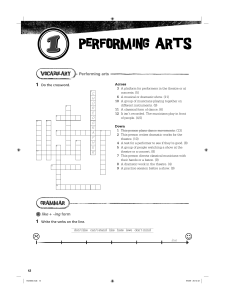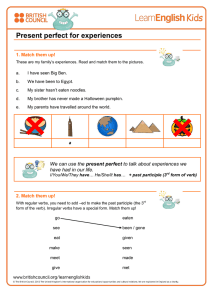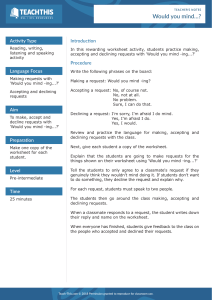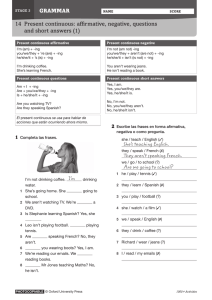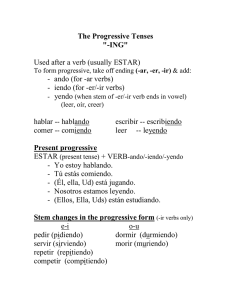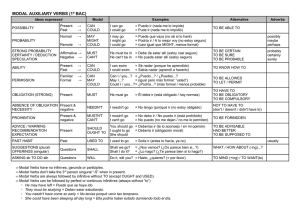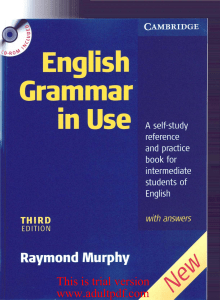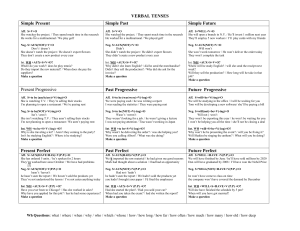Making words end with “-ing”
Anuncio
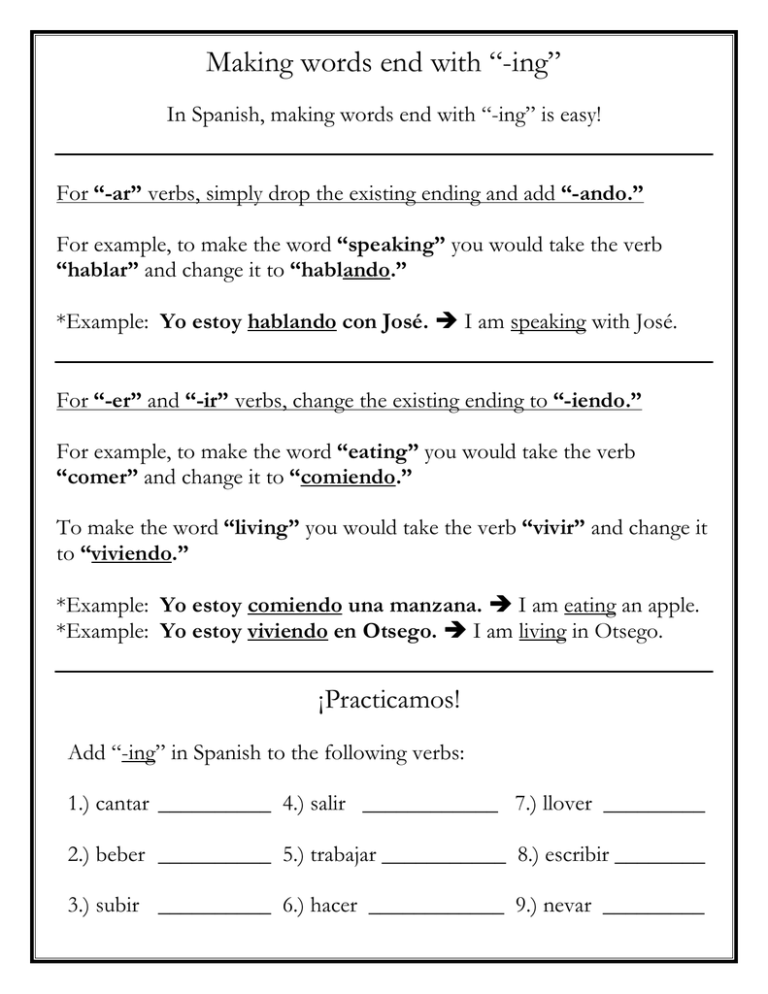
Making words end with “-ing” In Spanish, making words end with “-ing” is easy! For “-ar” verbs, simply drop the existing ending and add “-ando.” For example, to make the word “speaking” you would take the verb “hablar” and change it to “hablando.” *Example: Yo estoy hablando con José. I am speaking with José. For “-er” and “-ir” verbs, change the existing ending to “-iendo.” For example, to make the word “eating” you would take the verb “comer” and change it to “comiendo.” To make the word “living” you would take the verb “vivir” and change it to “viviendo.” *Example: Yo estoy comiendo una manzana. I am eating an apple. *Example: Yo estoy viviendo en Otsego. I am living in Otsego. ¡Practicamos! Add “-ing” in Spanish to the following verbs: 1.) cantar __________ 4.) salir ____________ 7.) llover _________ 2.) beber __________ 5.) trabajar ___________ 8.) escribir ________ 3.) subir __________ 6.) hacer ____________ 9.) nevar _________ Irregular “-ing” Words Of course, just like everything else in Spanish, there are exceptions to the rule when adding “-ing” to verbs. Here are some irregularities: 1.) The “-ing” form of “-er” and “-ir” verbs with stems ending in a vowel is formed by adding “-yendo” instead of “iendo.” Examples: caer (to fall) creer (to believe) leer (to read) oír (to hear) traer (to bring) cayendo creyendo leyendo oyendo trayendo 2.) Stem-changing “-ir” verbs change the stem vowel from (ei) and also from (ou). Examples: decir (to say, to tell) dormir (to sleep) morir (to die) pedir (to ask for, to order) sentir (to feel, to be sorry) venir (to come) diciendo durmiendo muriendo pidiendo sintiendo viniendo 3.) Two other verbs with irregular “-ing” forms are: ir (to go) poder (to be able to) yendo pudiendo *These last two verbs are rarely used in the “-ing” form, since the meaning of their present and past tense forms essentially eliminate the need for their use in this special “-ing” form. For example: I am going to the party I am able to swim. I was going to the party. I was able to swim. Yo voy a la fiesta. Yo puedo nadar. Yo iba a la fiesta. Yo podía nadar. Using progressive tenses (Using “-ing” in Sentences) Using words that end in “-ing” is pretty simple in Spanish. It works in pretty much the same way as it does in English. In Spanish, we typically use a form of the verb “estar” in front of any word ending in “-ing.” For example, in the present tense, we could say: Estoy hablando con María. Estás viviendo en Rogers. José está abriendo la puerta. Estamos comiendo pupusas. Estáis cantando muy bien. Están trabajando mucho. I am speaking with María. You are living in Rogers. José is opening the door. We are eating pupusas. You guys are singing very well. They are working a lot. Since we use a form of estar in front of “-ing” words, this would be a good time to review the present tense forms of the verb “estar.” ESTAR Yo Tú Él/Ella/Ud. estoy estás está Nosotros Vosotros Ellos/Ellas/Uds. estamos estáis están *Remember that the verb “estar” is irregular, and has accents in every form except for “yo” and “nosotros.” Also, the “yo” form is “estoy.” ¡Practicamos! – Try writing the following sentences in Spanish: 1.) I am studying Spanish. _____________________________ 2.) They are drinking water. _____________________________ 3.) We are listening to music. _____________________________ ¡Practicamos con los progresivos (estar +“-ing”)! Write the following sentences in Spanish, replacing the underlined words with the correct form of the verb “estar” in the present tense and the “-ing” form of the second verb. Modelos: I am eating an enchilada. We are living in Dayton. Estoy comiendo una enchilada. Estamos viviendo en Dayton. 1.) They are working today. _____________________________ 2.) We are learning a lot. _____________________________ 3.) You are writing a letter to José. _____________________________ 4.) Are you drawing a flower? _____________________________ 5.) Marcos is living in Anoka. _____________________________ 6.) I am selling shoes. _____________________________ 7.) Rosa is shouting a lot. _____________________________ 8.) We are singing with the choir. _____________________________ 9.) The teacher is explaining the test. _____________________________ 10.) I am listening to rock music. _____________________________ 11.) My dad is paying the bill. _____________________________ 12.) We are receiving many gifts. _____________________________ 13.) They are answering the question. _____________________________ 14.) I am watching the television. _____________________________ 15.) Are you buying new shoes? _____________________________ to work trabajar to learn aprender to write escribir to draw dibujar to live vivir to sell vender to shout gritar to sing cantar to explain explicar to listen escuchar to pay for pagar to receive recibir to answer contestar to watch mirar to watch mirar to buy comprar a letter una carta a flower una flor the choir el coro the test el examen the bill la cuenta gifts regalos the question la pregunta the television el televisor
